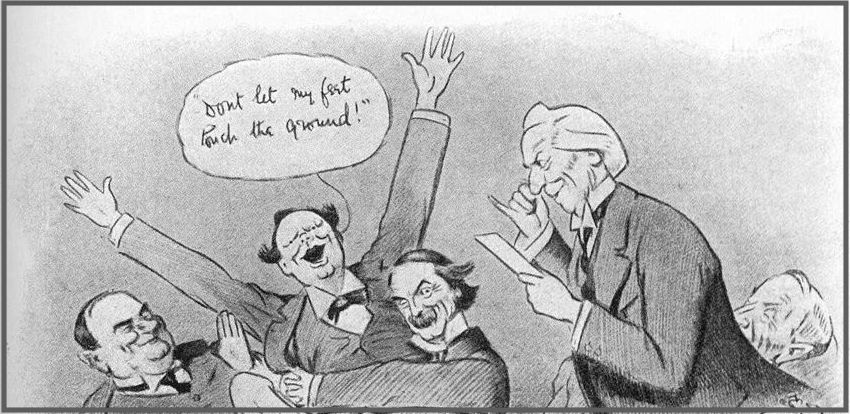
Was Churchill a Closet Socialist?
Q: Churchill as Socialist?
Mr. Randall Brown writes: “I’ve just read Ralph Raico‘s article ‘Rethinking Churchill,’ dating back over 20 years. He was I believe a voice for the Mises Institute. He makes Churchill sound like a war-mongering, fuming socialist liberal, a cheap power-mad opportunist! It really upset me. How do you answer writers like this?
A: Not quite the right fit
(Updated from 2009.) That certainly is an eclectic mixture of sins! Fortunately, I don’t have to answer, because I published a response to the late Professor Raico (as paraphrased by Adam Young) in Finest Hour 18 years ago by my colleague Michael McMenamin. It is available to interested readers. Dr. Raico was a distinguished libertarian scholar, but his thesis was one-dimensional. He simply could not get over Churchill’s reliance on the State where he thought it had a role. That often troubles libertarians who otherwise admire Churchill. He was not an opponent of State intervention under certain circumstances. But what circumstances? That is a complicated question. We still wrestle with it today.
Churchill was a crusading member of Britain’s Liberal Party from 1904 to 1922. He was adamantly anti-socialist (if by socialist we mean someone who favors government control of all means of production). Churchill was however appalled by the poverty in parts of Edwardian Britain. He promoted what he called a “Minimum Standard” to address the legitimate needs of the citizen without compromising constitutional liberties. That is a fine line to walk, but his aim was to forestall socialism, and thus to avoid its evils: the stifling of initiative, the concentration of power out of the hands of the people.
Many who appreciate Churchill as a statesman less often recognize that he was also a serious political philosopher. He learned from experience and, as William Manchester wrote, “usually improved as he went along.” His ideas are still relevant—not because history repeats, which it doesn’t. Churchill was a keen observer of human nature—and that never changes. The best account in print of Churchill’s political philosophy is by Larry P. Arnn, President Hillsdale College, which I recommend to readers: Churchill’s Trial: Winston Churchill and the Survival of Free Government.
Toward a just society
I referred your question to Dr. Arnn, who knows far more about it than I. His comments are reprinted here by kind permission:
Churchill was a political thinker. He understood that the first division in politics is between the few rich and the many poor. He looked for a way to ameliorate that division, and to make the society stable. The United States provided a model for much of this. Churchill was then pursuing justice, the arrangement of goods, offices, and honors according to the merit of those receiving them, and the interest of the State.
He was profoundly for a liberal society, in which the economy is driven by private enterprise, and in which money is allowed to “fructify,” as he quoted John Morley, “in the pockets of the people.” The modern world, the world that requires freedom of religion and limited government, can abide no other kind of politics. But this kind of politics is demonstrably vulnerable to war. It is also vulnerable domestically. If a disaffected majority, necessarily made up of the many who are poor, or relatively poor, expropriate the wealth of the few, it is a tragedy that will destroy justice in the state—even if the poor have a grievance against the rich.
Churchill was trying to prevent that. How? There one must understand what he meant by “Constitutionalism.” For Churchill, this is a very rich subject, rather like the writings of James Madison.He saw the problem of bureaucracy, and of excesses by the majority, very clearly from an early day. The problem is more mature now than it was in his time. That is why it is easy for some of Churchill’s solutions to look leftish from our modern vantage point.
Liberty
The answer to your question, then, is that not a “closet socialist.” He thought socialism, a far milder form than what we know today, incompatible with human liberty and an obstruction to human progress. Careful study of Churchill’s complex views will show that above all he regarded liberty as the most important characteristic of a just society.
Further reading
Soren Geiger, “Churchill: What We Mean by ‘Civilization,'” 2019
Richard Langworth, “Democracy is the worst form of government….,” 2009
_____ _____, “A Life Devoted to Constitutional Liberty,” 2021






